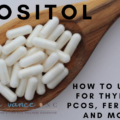More than 3 million adults in the U.S. take melatonin supplements, and use has more than doubled just in the past 10 years. But is melatonin safe, and is it right for you? Should you take melatonin? Let’s take a look at its benefits and how to use it safely.
What is Melatonin?
Melatonin is a neurohormone, which is a fancy way of saying it’s a chemical messenger (hormone) produced in the pineal gland in your brain (neuro). Melatonin is super important for the regulation of your circadian rhythms (your body’s clock related to light and dark) and sleep cycles. It’s produced in response to peak darkness and prepares the body for rest by inducing sleepiness, decreasing body temp, and slowing respiration. That’s why it’s so important to sleep in a very dark room: Melatonin production–and therefore your sleep– will suffer if you sleep with a night light, the TV on, or have street lights streaming in your window (hello blackout curtains). Melatonin levels are low during the day when you’re exposed to light and are inhibited as soon as the sun comes up so you wake up in the morning.
Melatonin acts as an immune booster, an antioxidant (fights free radical damage), and it has powerful anti-aging properties. It modulates the immune system and is cancer protective. Studies show those with lower melatonin levels (especially people who work the night shift) are at a higher risk for cancer. (source) Melatonin declines with age and may be associated with age-related diseases. (source) Supplementing with melatonin could help older adults enhance their antioxidant protection against Alzheimer’s disease, Parkinson’s disease, and stroke.
Years ago I used to discourage melatonin supplementation because taking hormones of any type can mess with your endocrine system. Women are especially impacted by taking supplemental hormones. For example, melatonin controls the timing and release of reproductive hormones in a woman’s body: It is instrumental in determining when menstruation begins, how long the cycle lasts, and when menopause occurs (melatonin supplementation may delay menopause). It may also stimulate progesterone production which can normalize the estrogen-progesterone balance and decrease breast cancer risk. (source)
There are (unproven) claims that taking melatonin may shut down your body’s own production, but there’s no solid science behind this.
Melatonin Benefits
There’s nothing more sublime than a good night’s sleep, amIright? Melatonin has most prominently been used as a sleep aid, but its benefits extend far beyond the realm of sleep.
- Sleep: used to treat insomnia. Melatonin can help promote healthy sleep patterns regardless of the cause of insomnia. May improve quality and length of sleep, as well as ease of falling asleep. Studies show that melatonin administration significantly reduced sleep latency (the amount of time needed to fall asleep) while boosting sleep efficiency (the percentage of time in bed spent asleep) and increasing total sleep duration. (source) Useful for the elderly, who have lower natural melatonin levels and therefore often have trouble sleeping.
- Improves circadian rhythms (use it if you’re wired at night and wiped during the day). Great for jet lag or night shift workers who need to reestablish regular sleep patterns. I recommend night shift workers take melatonin when they need to sleep to combat lower levels.
- Alzheimer’s: benefits these patients by improving sleep and reducing late-day aggravation of symptoms. Melatonin has also been found to decrease cognitive deterioration in individuals with Alzheimer’s disease, possibly by protecting brain cells from the toxic protein, beta-amyloid.(source) May also help Parkinson’s patients.
- Stroke: melatonin may offer important protection against stroke-related damage and deterioration. When administered at the time of stroke, melatonin limited the area of brain tissue damage, decreased brain cell death, lessened behavioral deficits, and reduced the rate of stroke-related death. (source)
- May reduce blood pressure.
- Cancer prevention and treatment: melatonin is a powerful antioxidant which may both prevent cancer and counteract the toxicity of chemotherapy. (source)
- Lifespan: In animal studies it has been shown to improve immunity and extend lifespan by 20 percent.
- Migraines: in a study with migraine sufferers, two thirds experienced at least a 50% reduction in number of headaches per month. Additionally, the intensity and duration of headaches decreased. The scientists believe that melatonin’s anti-inflammatory effect and free-radical-scavenging effects contribute to its headache-relieving benefits.(source)
- GI issues: I’ve been seeing studies lately that link melatonin to a reduction in IBS symptoms, as well as effectiveness for treating h pylori, gastritis, and GERD. (source and source)
- May boost thyroid hormone in those with primary (not autoimmune) hypothyroidism. (source)
How to Supplement with Melatonin
Sounds too good to be true, right? Use caution when supplementing with melatonin, however. The biggest mistakes I see when people take melatonin supplements are using too high of a dose and a poor quality supplement. The ideal dose of melatonin starts at 0.3 milligrams for insomnia. You read that right: 0.3 milligrams. Most supplements start at FIVE milligrams. I’ve seen 10-20 milligram doses. A megadose like that can leave you groggy and hungover. One MIT study found that when the brain’s melatonin receptors are exposed to too much of the hormone, they become unresponsive. (source)
More is not better! ALWAYS start with the lowest dose of melatonin you can find: I recommend starting with 0.3mg. You can increase until desired results are achieved. Or buy the 1 milligram dosage (I like this one) and cut it in half. It’s unfortunately difficult to find the lower dose melatonin supplements. The caveat to this is if you’re using melatonin therapeutically for disease treatment: 5 – 20mg doses may be warranted in this case.
The melatonin you buy in supplements is synthetic but works like the real thing. Quality matters: I ALWAYS vet my supplements for safety and efficacy. Melatonin supplements are unregulated and may contain fillers and unsavory ingredients. I only use Designs for Health (<— you can use half) or Source Naturals. If you’re primarily using it for insomnia, I love and recommend this melatonin sleep gummy. You can even bite off half of it to start at a lower dose to see what works ideally for you.
Melatonin Concerns
Though melatonin has a pretty solid safety record, I do not recommend using it unless you have insomnia or are using it for any of the aforementioned conditions. In my opinion it should be a last resort as a sleep aid. We as a culture want a quick fix in a magic pill, but it’s best to address conditions naturally before supplemental support. Work on your sleep hygiene habits first: sleep in a very dark, quiet room, remove electronics, no computers before bedtime (shuts down melatonin production); put yourself on a sleep schedule. The key is to determine what is causing melatonin deficiency (more on that below). If that doesn’t work, try a low dose for a while. I myself have used melatonin during periods of stress that caused restless sleep and have had good results.
Still, melatonin may be unsafe for children and adolescents. Melatonin affects the cardiovascular system (in a beneficial way in adults) and endocrine system, and these effects on developing bodies are unstudied to date. (source) I personally would not use or recommend melatonin to anyone under age 21.
Finally, avoid melatonin if you have Graves’ disease or autoimmune thyroid (Hashimoto’s). It may exacerbate these conditions. (source)
Increase Melatonin Naturally
So why DO our melatonin levels tank? Well, aging is one cause. But the 24-7 exposure to bright lights is another. Our bodies are designed to rise and fall with the sun. That means that when the sun goes down, we’re exposed to increasing darkness at night that eventually makes us sleepy. Then when the sun comes up, we wake up. But these days we use bright, artificial lights well into the night, compounded by late night TV, computers, and staring at phone screens. So when our body should normally secrete melatonin at night, watching television or going on the computer delays the process.
If you’re sleeping in a room that’s not completely dark, you may not be producing enough melatonin. Use blackout curtains and brush up on your sleep hygiene habits. Try also dimming lights in your house and bedroom beginning at 9pm.
Another factor in melatonin deficiency is the neurotransmitter serotonin, which is a precursor to melatonin. If you don’t produce enough of the neurotransmitter serotonin (common in those with depression and anxiety), you’ll have lower levels of melatonin. You can increase serotonin by getting plenty of high quality protein or taking a 5HTP supplement.
Do you take melatonin? How has it worked for you?
Pin it!

Mary Vance is a Certified Nutrition Consultant and author specializing in digestive health. She combines a science-based approach with natural therapies to rebalance the body. In addition to her 1:1 coaching, she offers courses to help you heal your gut and improve your health. Mary lives in San Francisco and Lake Tahoe in Northern California. Read more about her coaching practice here and her background here.









